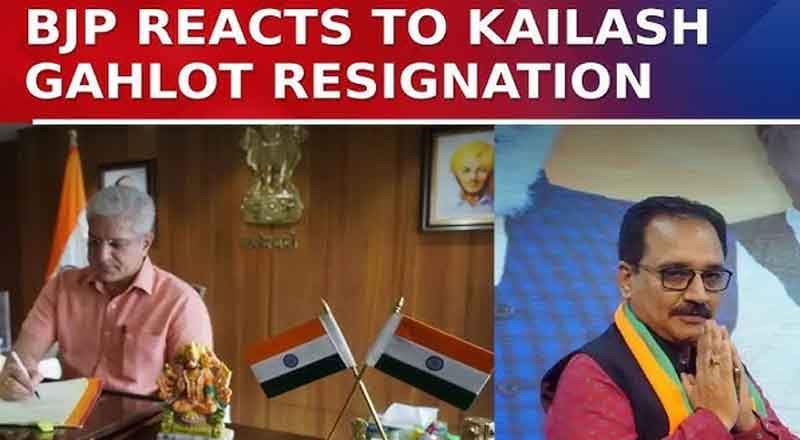Kailash Gahlot – From AAP Loyalist to BJP’s New Asset
Kailash Gahlot’s political journey has been marked by steadfast loyalty to the Aam Aadmi Party (AAP) and significant contributions to governance in Delhi. As a senior minister in the AAP government, Gahlot held portfolios like Transport, Home, Women and Child Development, and Administrative Reforms. His defection to the Bharatiya Janata Party (BJP), mere months before the Delhi Assembly elections, signals a seismic shift in the political landscape, with potential consequences for both AAP’s electoral prospects and BJP’s strategy in the capital.
A Stalwart of the AAP Ranks
Gahlot was not just another minister in the AAP government; he was a key figure in shaping Delhi’s progressive governance model. Born in Mitraon village, Gahlot had a modest beginning in a family of agriculturists. A law graduate from Delhi University, he practiced at the Delhi High Court and Supreme Court before joining the political fray in 2015.
Winning the Najafgarh seat by a slim margin in 2015 and a more substantial one in 2020, Gahlot emerged as AAP’s Jaat face in Delhi. His leadership in introducing flagship initiatives like the Electric Vehicle Policy, “Pink Pass” for women’s free bus travel, and the electrification of bus depots was instrumental in modernizing Delhi’s transport system.
The Rift with AAP’s Leadership
Despite his accolades, tensions between Gahlot and AAP leadership simmered over the years. His dissatisfaction reportedly began after the arrest of former Deputy Chief Minister Manish Sisodia and the subsequent reshuffling of portfolios.
Initially assigned the finance portfolio and tasked with presenting the budget, Gahlot’s prominence was eclipsed when Atishi and Saurabh Bharadwaj were appointed as ministers, taking over significant responsibilities. According to insiders, Gahlot felt side-lined as Atishi’s rise within the party diminished his influence.
Further, Gahlot’s association with Delhi’s Lieutenant Governor Vinai Kumar Saxena, including shared appearances at Transport Department events, added to the strain between him and AAP’s top brass. His frustration became evident when key portfolios like Law and Revenue were removed from his charge.
Defection to the BJP: A Strategic Move
Gahlot’s decision to join the BJP one day after resigning from AAP has both personal and political undertones. Publicly, he cited AAP’s “constant fights with the Centre,” lack of focus on governance, and internal controversies as reasons for his departure. Politically, his move is poised to strengthen BJP’s position in Delhi, particularly among the Jaat community in Najafgarh.
The timing of his resignation and defection is critical, with Delhi Assembly elections on the horizon. His influence in Najafgarh and his administrative experience make him a valuable addition to BJP’s campaign machinery. Sources suggest he is likely to contest from Najafgarh under the BJP banner.
Impact on AAP’s Prospects
Gahlot’s exit is a significant blow to AAP, as it struggles to maintain cohesion amid internal rifts and external challenges. His departure not only weakens AAP’s electoral strategy but also disrupts the implementation of critical welfare schemes, such as the Mahila Samman Rashi project.
Gahlot’s role in rolling out high-profile initiatives and managing key departments underscores the void his absence creates. As one of AAP’s key backroom operators, his departure also signals potential unrest within the party’s ranks.
BJP’s Gain: Expanding its Reach in Delhi
For the BJP, Gahlot’s entry provides an opportunity to bolster its image as a party capable of attracting experienced administrators and seasoned politicians. His reputation for effective governance and rapport with the Jaat community could help BJP make inroads in constituencies where AAP has traditionally dominated.
A Defection with Broader Implications
Kailash Gahlot’s defection from AAP to BJP is more than a political switch; it is a reflection of the evolving dynamics in Delhi’s political landscape. For AAP, his departure is a setback that challenges its ability to retain its voter base and execute its welfare agenda. For BJP, it represents a strategic gain, offering a foothold in the upcoming Assembly elections.
As Delhi braces for a high-stakes electoral battle, Gahlot’s move underscores the importance of leadership, loyalty, and timing in the ever-shifting world of politics. Whether his defection reshapes the electoral fortunes of BJP or merely complicates AAP’s strategy will become evident in the months to come.
(With inputs from agencies)





